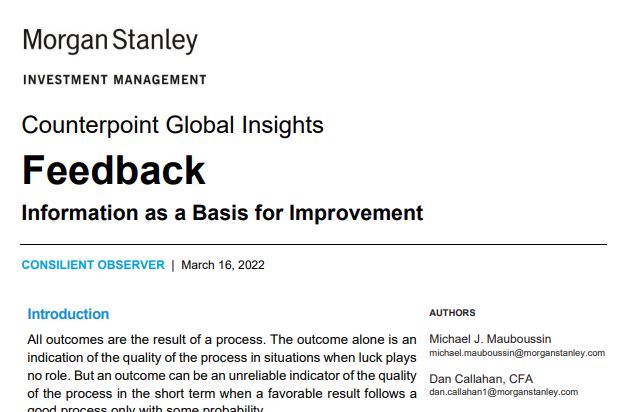In his latest paper titled Feedback- Information as a Basis for Improvement, Michael Mauboussin explains how feedback can improve your investment process. Here’s an excerpt from the paper:
Feedback is information that is applied to improve results. In this report, we focused on how feedback can improve the long-term outcomes for investment organizations.
We started by discussing the qualities of good thinking, including the characteristics of superforecasters, a group that made accurate forecasts above what chance would dictate, and the rationality quotient, a measure of rational decision making. The important insight is that intelligence quotient and rationality quotient measure different things and have only partial overlap. Superforecasters would likely score high on the test of rationality. In particular, a significant attribute is being actively open-minded.
Getting the right people is great, and their skills can be enhanced through proper training. Learning how to apply base rates properly is a particularly effective tool for decision makers facing probabilistic outcomes. Beyond training, it is crucial to consider an appropriate ratio between practice and play. Investing is difficult in that there is always some information out there that we don’t know. As a result, the temptation is to play constantly. But evidence in other fields suggests that allocating some time to practice, assuming the possibility of skill transfer, may lead to improved outcomes.
Investors rarely operate fully autonomously and are generally part of an organization. That organization can shape beliefs and productivity. We discussed a number of key considerations, including the organization’s governing objective, the degree to which incentives align with that objective, the function of teams within organizations, and what type of environment is most conducive to success in a field dominated by heuristic tasks.
Generating timely and accurate feedback for fundamental investors can be difficult because the process is rarely uniform and the outcomes are noisy. One approach to dealing with this problem is to break an investment thesis into subcomponents and to track the accuracy of each of the probabilistic forecasts.
Buying or selling a security with an expectation of excess returns implies a view of what is going to happen that the market has yet to reflect in a price. The objective is to translate that variant perception into a cluster of measurable results and to keep score of how well the outcomes match the subjective inputs.
The encouraging news is that there is evidence that receiving timely and accurate feedback makes you a better forecaster. The apparatus to provide this feedback exists, but implementation requires some focus and discipline.
You can read the entire paper here:
Michael Mauboussin: Feedback- Information as a Basis for Improvement
For all the latest news and podcasts, join our free newsletter here.
Don’t forget to check out our FREE Large Cap 1000 – Stock Screener, here at The Acquirer’s Multiple:



